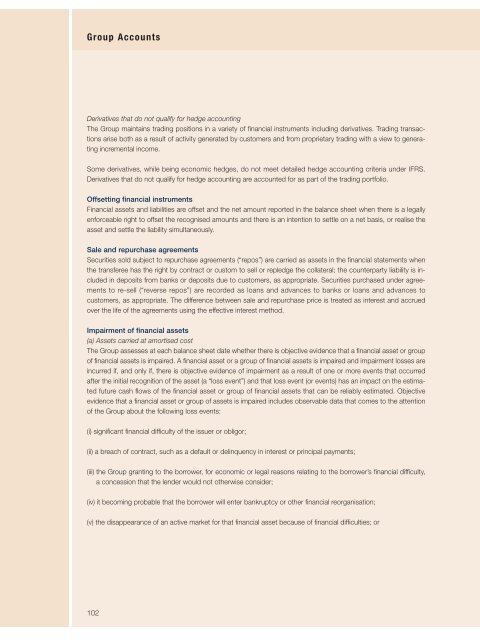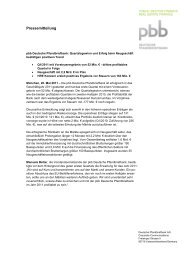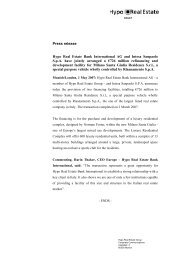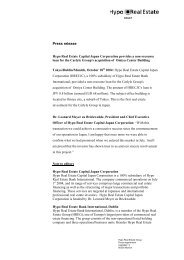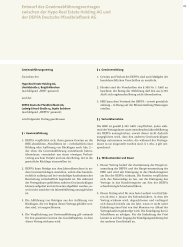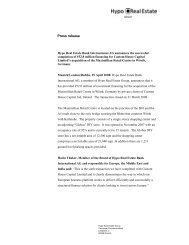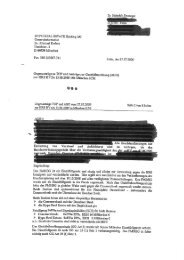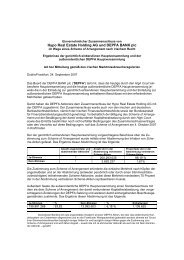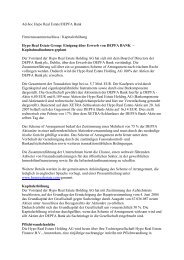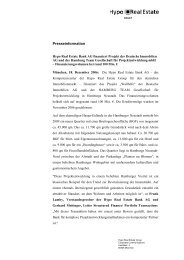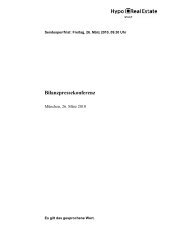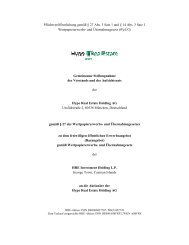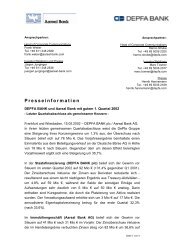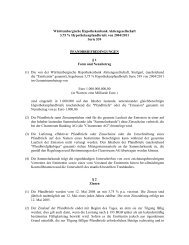annual report - Hypo Real Estate Holding AG
annual report - Hypo Real Estate Holding AG
annual report - Hypo Real Estate Holding AG
You also want an ePaper? Increase the reach of your titles
YUMPU automatically turns print PDFs into web optimized ePapers that Google loves.
Group Accounts<br />
Derivatives that do not qualify for hedge accounting<br />
The Group maintains trading positions in a variety of financial instruments including derivatives. Trading transac -<br />
tions arise both as a result of activity generated by customers and from proprietary trading with a view to generating<br />
incremental income.<br />
Some derivatives, while being economic hedges, do not meet detailed hedge accounting criteria under IFRS.<br />
Derivatives that do not qualify for hedge accounting are accounted for as part of the trading portfolio.<br />
Offsetting financial instruments<br />
Financial assets and liabilities are offset and the net amount <strong>report</strong>ed in the balance sheet when there is a legally<br />
enforceable right to offset the recognised amounts and there is an intention to settle on a net basis, or realise the<br />
asset and settle the liability simultaneously.<br />
Sale and repurchase agreements<br />
Securities sold subject to repurchase agreements (“repos”) are carried as assets in the financial statements when<br />
the transferee has the right by contract or custom to sell or repledge the collateral; the counterparty liability is included<br />
in deposits from banks or deposits due to customers, as appropriate. Securities purchased under agreements<br />
to re-sell (“reverse repos”) are recorded as loans and advances to banks or loans and advances to<br />
customers, as appropriate. The difference between sale and repurchase price is treated as interest and accrued<br />
over the life of the agreements using the effective interest method.<br />
Impairment of financial assets<br />
(a) Assets carried at amortised cost<br />
The Group assesses at each balance sheet date whether there is objective evidence that a financial asset or group<br />
of financial assets is impaired. A financial asset or a group of financial assets is impaired and impairment losses are<br />
incurred if, and only if, there is objective evidence of impairment as a result of one or more events that occurred<br />
after the initial recognition of the asset (a “loss event”) and that loss event (or events) has an impact on the estimated<br />
future cash flows of the financial asset or group of financial assets that can be reliably estimated. Objective<br />
evidence that a financial asset or group of assets is impaired includes observable data that comes to the attention<br />
of the Group about the following loss events:<br />
(i) significant financial difficulty of the issuer or obligor;<br />
(ii) a breach of contract, such as a default or delinquency in interest or principal payments;<br />
(iii) the Group granting to the borrower, for economic or legal reasons relating to the borrower’s financial difficulty,<br />
a concession that the lender would not otherwise consider;<br />
(iv) it becoming probable that the borrower will enter bankruptcy or other financial reorganisation;<br />
(v) the disappearance of an active market for that financial asset because of financial difficulties; or<br />
102


